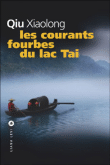Originally published on Rue89, 05/07/2010.
Pollution by green algae is no promotion for tourism. This is true for some beaches in France,in Brittany, but also for Lake Tai. Only one hour by train from Shanghai, it is unlikely to be part of the tours offered to visitors of the Expo. This is what tells us the latest novel by Qiu Xiaolong, the master of the Chinese detective story.
The city of Wuxi, north of Lake Tai, is a little industrial Shanghai with 2.5 millions inhabitants. A few years ago, the lake was the idyllic setting of a recreation center for Communist Party officials.
A far reaching meeting :
Inspector Chen Cao, the favorite character of Qiu Xialong,well connected, is offered to spend a few days. A holiday where he meets Shansan, a charming environmental activist who explains how the lake is polluted by green algae.
Shansan, an engineer at a chemical plant, was not able to convince Director Liu to reduce such pollution; the future listing of the company on the stock exchange is the only concern of Director Liu who will become a rich man.
Local authorities, whatever they claim, are against any measures that could reduce growth as their career depends on economic development and their lifestyle on the “red envelopes” handed over by companies …
Liu is found dead and Shansan is questioned by the police. Chen Cao decides to lead his own investigation and discovers the complicated private lives of Liu and Fu his deputy and the role of Jiang, environmental activist, but also a consultant to several companies and very close to Shansan.
The survey allows us to enjoy the company of our favorite Inspector: Chen Cao is impressive with his knowledge of political circles, his ambition as a young executive on the way up but who never forgets its Confucian principles, his love for poetry and pretty … women.
The green algae of Lake Tai:
This shallow lake, is one of the three largest in China. It is celebrated for its beauty in literature and poetry and has provided the enormous limestone rocks in the beautiful traditional gardens of Suzhou.
In 2007, with the algae, there was no drinking water for millions of people in Wuxi. The panic and scandal were enormous and the authorities had to close hundreds of factories and programmed billions of investments.
Around these events, Qiu Xiaolong’s wrote his seventh novel, a detective “green” story but he feels less comfortable as if it was a compulsory topic. Where is the passion for “The Mao Case ” or the dark years of his earlier novels (“Death of a red heroine”)? Nevertheless his talent for characters and atmosphere is to be found in the short stories translated in France in 2008 “City of Red Dust: stories of Shanghai” (and available in English next september).
Environmentalists are more dangerous than pollution:
The character of the activist Jiang was probably inspired by Wu Lihong, a farmer turned ecological activist. Having brought the attention of the authorities in Beijing on the pollution of the lake, his life was made miserable by local officials, he and his wife were fired by the factories that employed them.
As Jiang in the novel, he was manipulated and received commissions on several contracts which permitted to accuse him of blackmail.The man was well known in China and abroad and the Central Government had then decided to act against this pollution, but this did not stop Wu Lihong of being sentenced with three years of detention in harsh conditions. He was released a few months ago, but it is still much too early to eat shrimp and fish from Lake Tai.
Bertrand Mialaret






